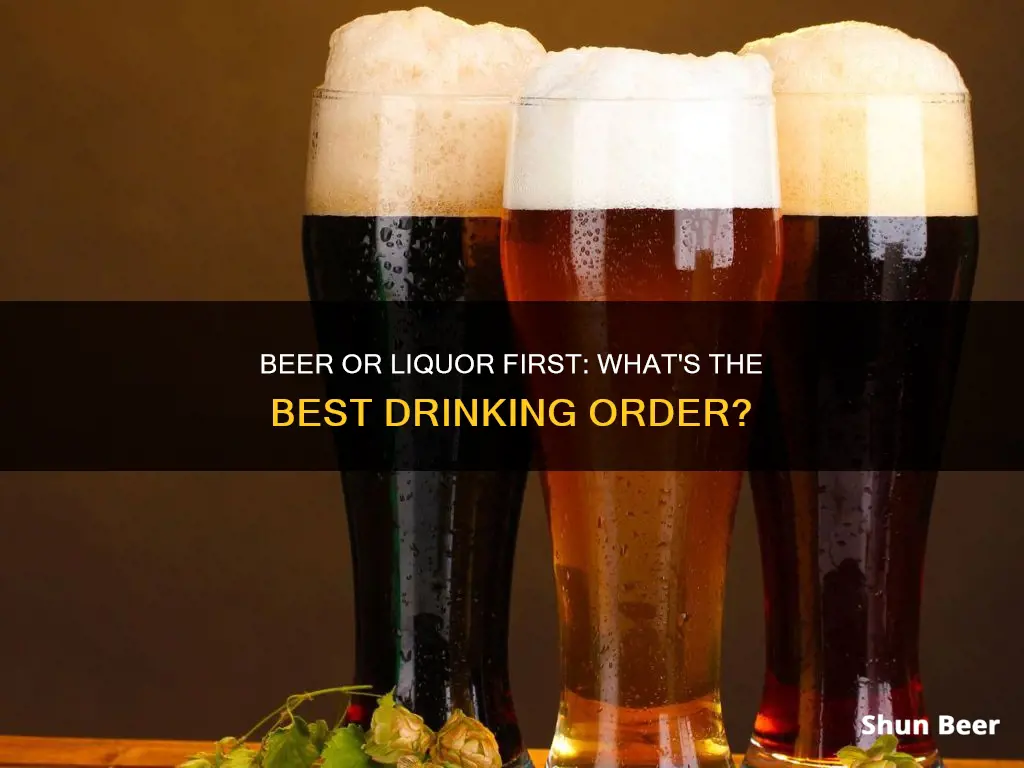
The saying beer before liquor, never been sicker; liquor before beer, you're in the clear is a widely known adage that has been passed down through generations. While the exact origins of this phrase are unknown, it is based on the belief that drinking beer before liquor will make you sick. However, recent studies have debunked this myth, showing that the order of drinking different types of alcohol has little to no impact on the severity of hangovers. Instead, factors such as dehydration, severe intoxication, and the total amount of alcohol consumed play a more significant role in determining hangover intensity.
| Characteristics | Values |
|---|---|
| Whether the order of drinking beer and liquor affects hangovers | No, the order of drinking beer and liquor does not affect hangovers. Factors that do affect hangovers include dehydration, severe intoxication, and the total amount of alcohol consumed. |
| The origin of the saying "beer before liquor, never been sicker; liquor before beer, you're in the clear" | The exact origin of the saying is unknown, but it is likely based on personal experiences and how people metabolize alcohol. |
| Whether drinking beer before liquor will make you sicker | Drinking beer before liquor will not make you sicker. However, starting with beer may trick you into getting more drunk than intended, as liquor has a higher alcohol content and will cause you to feel intoxicated sooner. |
| Factors that affect how you feel after drinking | The amount of alcohol consumed, drinking on an empty stomach, dehydration, genetics, congeners (additives found in dark liquors), and smoking. |
What You'll Learn
- The amount of alcohol consumed matters more than the order
- Carbonated drinks irritate the stomach lining, increasing alcohol absorption
- Alcohol is a diuretic, causing dehydration and a potential hangover
- Drinking on an empty stomach increases the likelihood of a hangover
- Genetics play a role in how susceptible you are to hangovers

The amount of alcohol consumed matters more than the order
The popular saying, "Beer before liquor, never been sicker; liquor before beer, you're in the clear," is a myth. While it is often believed that the order in which you drink beer and liquor can affect how sick you get, recent studies have shown that this is not the case. The main factor that determines whether you will experience a hangover or get sick is the total amount of alcohol consumed.
Dr Shaun Carrillo, lead wellness coach at Providence St. Joseph Hospital, confirms that "the order in which you consume your drinks is not likely to determine whether you will experience a hangover the next morning." This is because alcohol is absorbed into the bloodstream as soon as it reaches the stomach, so by the time a hangover sets in, all the alcohol has already been absorbed. Therefore, as long as the total amount of alcohol consumed remains the same, the order of drinking beer and liquor does not significantly affect the likelihood or severity of a hangover.
However, it is important to note that drinking beer first can trick you into getting more drunk than intended. Beer has a lower alcohol by volume compared to liquor, so when you drink beer, your blood alcohol content rises more slowly. Starting with drinks that have a lower alcohol content can lead to drinking at a faster pace later on when switching to liquor, potentially resulting in drinking more than intended.
Other factors that can affect hangover symptoms and the likelihood of getting sick include dehydration, drinking on an empty stomach, genetics, congeners (additives found in dark liquors), and vomiting. To reduce the severity of hangovers, it is recommended to drink in moderation, eat while drinking, and stay hydrated.
Did Jesus' Disciples Drink Beer? Exploring Ancient Beverage Choices
You may want to see also

Carbonated drinks irritate the stomach lining, increasing alcohol absorption
Carbonated drinks can irritate the stomach lining, increasing alcohol absorption. This is due to the carbonation in these beverages, which can cause digestive issues such as stomach pain, bloating, and gas. The carbonation increases gastric volume, leading to feelings of fullness and nausea. This may be why drinking carbonated alcoholic beverages, such as beer, before liquor is associated with increased feelings of intoxication and hangover severity.
Carbonated drinks introduce air into the stomach, similar to eating or drinking too fast. This can cause stomach pain and discomfort. Additionally, the carbonation in these drinks can irritate the stomach lining, further increasing the rate of alcohol absorption. The combination of carbonation and alcohol can also lead to gastric mechanical distress, especially when consuming more than 300 ml of a carbonated fluid.
The high carbonation in a typical serving of beer (12 ounces) can enhance the intoxicating effects of alcohol. This may be why drinking beer before liquor is often associated with increased hangover severity. The carbonation speeds up alcohol absorption, leading to higher blood alcohol levels and more intense hangover symptoms.
Research supports this theory, showing that most study subjects absorbed vodka faster when mixed with carbonated water. Additionally, carbonated beverages can make people feel as if they have consumed more than they actually have due to gastric filling, or filling the stomach with air from the bubbles. This may also contribute to the perception of increased intoxication when drinking carbonated alcoholic beverages.
While the order of drinking may not be the sole factor determining hangover severity, it is important to consider the potential impact of carbonation on alcohol absorption. The combination of carbonation and alcohol can irritate the stomach lining and increase the rate of absorption, leading to more intense effects and hangover symptoms. Therefore, it may be advisable to avoid drinking carbonated alcoholic beverages on an empty stomach or in excess to minimize the risk of irritation and other negative side effects.
Drinking Beer and Losing Weight: How Often Can I Indulge?
You may want to see also

Alcohol is a diuretic, causing dehydration and a potential hangover
Alcohol is a diuretic, which means it promotes water loss through urine. It does this by inhibiting the production of a hormone called vasopressin, which usually tells your kidneys to reabsorb water if your body needs it, rather than flushing it out through the bladder. When you drink alcohol, the signal from vasopressin is switched off, so your bladder fills up with urine, and you need to pee more often. This can disrupt your sleep, especially when combined with alcohol's effect on the restorative REM stage of sleep.
Drinking alcohol can lead to dehydration if you don't replace the excess fluid you lose. Dehydration is more likely in hot weather, even without drinking alcohol, so it's important to be aware of the risks when drinking in warm conditions. Dehydration can become serious and lead to confusion and seizures if left untreated. It can also worsen hangover symptoms, such as feeling thirsty, dizzy, lightheaded, tired, and experiencing a dry mouth and lips.
To avoid dehydration and minimize the diuretic effect of alcohol, it's important to drink water along with alcoholic beverages and to limit your alcohol intake.
Beer Drinking Champions: Who Consumes the Most?
You may want to see also

Drinking on an empty stomach increases the likelihood of a hangover
Drinking on an empty stomach is likely to increase the likelihood of a hangover. This is because alcohol is absorbed into the bloodstream as soon as it reaches the stomach. When drinking on an empty stomach, alcohol passes through the stomach and quickly reaches the small intestine, where it is absorbed even more rapidly, causing blood alcohol levels to spike.
The stomach is an expandable pouch that can normally hold about one litre of food but can sometimes hold two or three times that amount. The stomach secretes digestive enzymes to break down food before it moves on to the small intestine, which is the primary place where the body absorbs nutrients. The small intestine is a long, thin, tube-like organ with a large surface area. It is built to absorb nutrients quickly.
When drinking on a full stomach, the alcohol has to wait in the stomach and is absorbed more slowly. Eating foods that take a long time to leave the stomach, such as high-protein, high-fat, or high-fibre foods, can further slow the absorption of alcohol. Examples of these include classic bar snacks like nachos, burgers, chicken wings, and pizza. For vegetarians, good options include dishes with ingredients like olive oil, legumes, avocado, and nuts.
Drinking on an empty stomach is not the only factor that can increase the likelihood of a hangover. The amount of alcohol consumed, how often you drink, genetics, congeners (additives found in dark liquors), and smoking can also play a role.
Naruto Fans: Beer Drinking with a Ninja Twist
You may want to see also

Genetics play a role in how susceptible you are to hangovers
There are many old sayings about the order in which you should consume different types of alcohol to avoid a hangover. One of the most common is "beer before liquor, never been sicker; liquor before beer, you're in the clear". However, recent studies have shown that the order in which you drink different types of alcohol doesn't matter as much as other factors when it comes to hangover severity.
So, what does affect how susceptible you are to hangovers? Well, according to various studies, genetics accounts for around 40-55% of the difference in hangover frequency and severity between individuals. In other words, nearly half of the reason one person experiences a hangover while another doesn't after drinking the same amount of alcohol could be down to their genes. For example, some individuals of Asian ancestry carry genes that trigger unpleasant effects after consuming even small amounts of alcohol. On the other hand, some people carry genes that delay the onset of these negative side effects, increasing their chances of developing alcohol use disorder.
Other factors that can influence hangover severity include dehydration, severe intoxication, the total amount of alcohol consumed, drinking on an empty stomach, vomiting, smoking, and gender (as alcohol tends to stay in the bloodstream longer for women than men).
Beer Left Out Overnight: Is It Safe to Drink?
You may want to see also
Frequently asked questions
Drinking beer before liquor won't make you sicker. However, starting with beer will get you drunk at a slower rate than liquor. This can trick you into drinking more than you intended.
The exact origin of the phrase is unknown, but it is likely based on the idea that carbonation irritates the stomach, causing people to absorb liquor more quickly.
No, there is no chemical reaction to drinking liquor before beer that wards off hangovers.
The best way to avoid getting sick is to drink in moderation. If you know you'll be drinking a lot, eat something before you start and drink at least one glass of water for every two alcoholic drinks.







